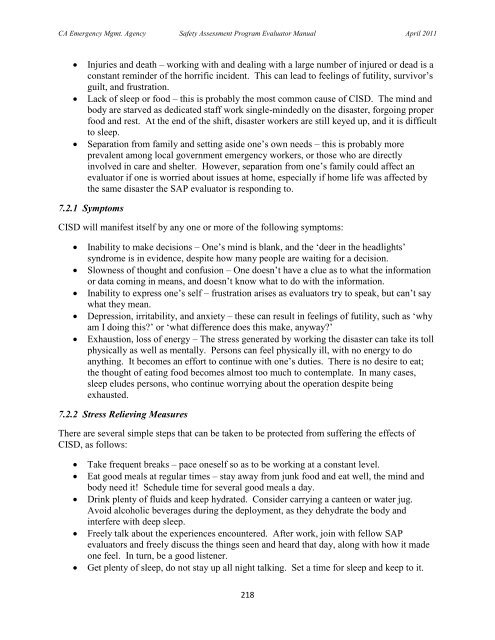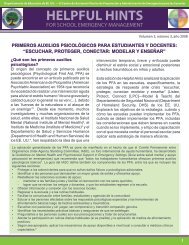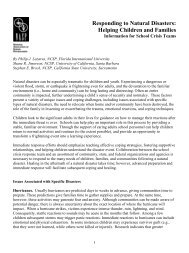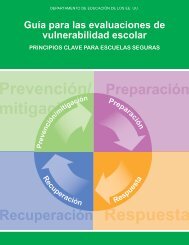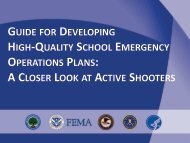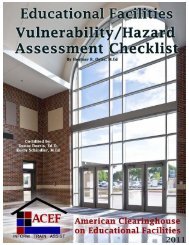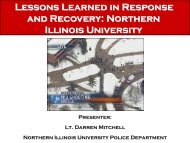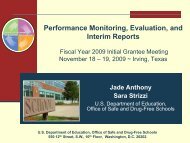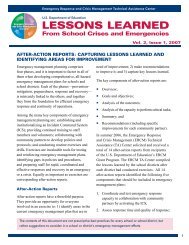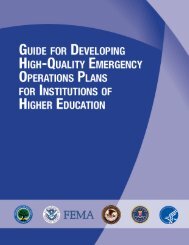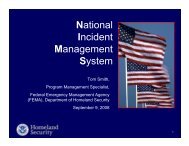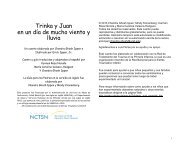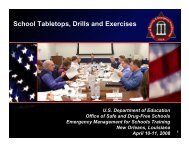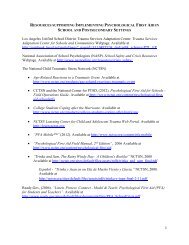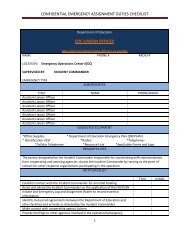- Page 1 and 2:
CA Emergency Mgmt. Agency Safety As
- Page 3 and 4:
CA Emergency Mgmt. Agency Safety As
- Page 5 and 6:
CA Emergency Mgmt. Agency Safety As
- Page 7 and 8:
CA Emergency Mgmt. Agency Safety As
- Page 9 and 10:
CA Emergency Mgmt. Agency Safety As
- Page 12 and 13:
CA Emergency Mgmt. Agency Safety As
- Page 14:
CA Emergency Mgmt. Agency Safety As
- Page 17 and 18:
CA Emergency Mgmt. Agency Safety As
- Page 19 and 20:
CA Emergency Mgmt. Agency Safety As
- Page 24 and 25:
CA Emergency Mgmt. Agency Safety As
- Page 26 and 27:
CA Emergency Mgmt. Agency Safety As
- Page 28 and 29:
CA Emergency Mgmt. Agency Safety As
- Page 31 and 32:
CA Emergency Mgmt. Agency Safety As
- Page 33 and 34:
CA Emergency Mgmt. Agency Safety As
- Page 35 and 36:
CA Emergency Mgmt. Agency Safety As
- Page 37 and 38:
CA Emergency Mgmt. Agency Safety As
- Page 39 and 40:
CA Emergency Mgmt. Agency Safety As
- Page 41 and 42:
CA Emergency Mgmt. Agency Safety As
- Page 43 and 44:
CA Emergency Mgmt. Agency Safety As
- Page 45 and 46:
CA Emergency Mgmt. Agency Safety As
- Page 47 and 48:
CA Emergency Mgmt. Agency Safety As
- Page 49 and 50:
CA Emergency Mgmt. Agency Safety As
- Page 51 and 52:
CA Emergency Mgmt. Agency Safety As
- Page 53 and 54:
CA Emergency Mgmt. Agency Safety As
- Page 55 and 56:
CA Emergency Mgmt. Agency Safety As
- Page 57 and 58:
CA Emergency Mgmt. Agency Safety As
- Page 59 and 60:
CA Emergency Mgmt. Agency Safety As
- Page 61 and 62:
CA Emergency Mgmt. Agency Safety As
- Page 63 and 64:
CA Emergency Mgmt. Agency Safety As
- Page 65 and 66:
CA Emergency Mgmt. Agency Safety As
- Page 67 and 68:
CA Emergency Mgmt. Agency Safety As
- Page 69 and 70:
CA Emergency Mgmt. Agency Safety As
- Page 71 and 72:
CA Emergency Mgmt. Agency Safety As
- Page 73 and 74:
CA Emergency Mgmt. Agency Safety As
- Page 75 and 76:
CA Emergency Mgmt. Agency Safety As
- Page 77 and 78:
CA Emergency Mgmt. Agency Safety As
- Page 79 and 80:
CA Emergency Mgmt. Agency Safety As
- Page 81 and 82:
CA Emergency Mgmt. Agency Safety As
- Page 83 and 84:
CA Emergency Mgmt. Agency Safety As
- Page 85 and 86:
CA Emergency Mgmt. Agency Safety As
- Page 87 and 88:
CA Emergency Mgmt. Agency Safety As
- Page 89:
CA Emergency Mgmt. Agency Safety As
- Page 93:
CA Emergency Mgmt. Agency Safety As
- Page 96 and 97:
CA Emergency Mgmt. Agency Safety As
- Page 98 and 99:
CA Emergency Mgmt. Agency Safety As
- Page 100 and 101:
CA Emergency Mgmt. Agency Safety As
- Page 102 and 103:
CA Emergency Mgmt. Agency Safety As
- Page 104 and 105:
CA Emergency Mgmt. Agency Safety As
- Page 106 and 107:
CA Emergency Mgmt. Agency Safety As
- Page 108 and 109:
CA Emergency Mgmt. Agency Safety As
- Page 110 and 111:
CA Emergency Mgmt. Agency Safety As
- Page 112 and 113:
CA Emergency Mgmt. Agency Safety As
- Page 114 and 115:
CA Emergency Mgmt. Agency Safety As
- Page 116 and 117:
CA Emergency Mgmt. Agency Safety As
- Page 118 and 119:
CA Emergency Mgmt. Agency Safety As
- Page 120 and 121:
CA Emergency Mgmt. Agency Safety As
- Page 122 and 123:
CA Emergency Mgmt. Agency Safety As
- Page 124 and 125:
CA Emergency Mgmt. Agency Safety As
- Page 126 and 127:
CA Emergency Mgmt. Agency Safety As
- Page 128 and 129:
CA Emergency Mgmt. Agency Safety As
- Page 130 and 131:
CA Emergency Mgmt. Agency Safety As
- Page 132 and 133:
CA Emergency Mgmt. Agency Safety As
- Page 134 and 135:
CA Emergency Mgmt. Agency Safety As
- Page 136 and 137:
CA Emergency Mgmt. Agency Safety As
- Page 138 and 139:
CA Emergency Mgmt. Agency Safety As
- Page 140 and 141:
CA Emergency Mgmt. Agency Safety As
- Page 142 and 143:
CA Emergency Mgmt. Agency Safety As
- Page 144 and 145:
CA Emergency Mgmt. Agency Safety As
- Page 146 and 147:
CA Emergency Mgmt. Agency Safety As
- Page 148 and 149:
CA Emergency Mgmt. Agency Safety As
- Page 150 and 151:
CA Emergency Mgmt. Agency Safety As
- Page 152 and 153:
CA Emergency Mgmt. Agency Safety As
- Page 154 and 155:
CA Emergency Mgmt. Agency Safety As
- Page 156 and 157:
CA Emergency Mgmt. Agency Safety As
- Page 158 and 159:
CA Emergency Mgmt. Agency Safety As
- Page 160 and 161:
CA Emergency Mgmt. Agency Safety As
- Page 162 and 163:
CA Emergency Mgmt. Agency Safety As
- Page 164 and 165:
CA Emergency Mgmt. Agency Safety As
- Page 166 and 167:
CA Emergency Mgmt. Agency Safety As
- Page 168 and 169: CA Emergency Mgmt. Agency Safety As
- Page 170 and 171: CA Emergency Mgmt. Agency Safety As
- Page 172 and 173: CA Emergency Mgmt. Agency Safety As
- Page 174 and 175: CA Emergency Mgmt. Agency Safety As
- Page 176 and 177: CA Emergency Mgmt. Agency Safety As
- Page 178 and 179: CA Emergency Mgmt. Agency Safety As
- Page 180 and 181: CA Emergency Mgmt. Agency Safety As
- Page 182 and 183: CA Emergency Mgmt. Agency Safety As
- Page 184 and 185: CA Emergency Mgmt. Agency Safety As
- Page 186 and 187: CA Emergency Mgmt. Agency Safety As
- Page 188 and 189: CA Emergency Mgmt. Agency Safety As
- Page 190 and 191: CA Emergency Mgmt. Agency Safety As
- Page 192 and 193: CA Emergency Mgmt. Agency Safety As
- Page 194 and 195: CA Emergency Mgmt. Agency Safety As
- Page 196 and 197: CA Emergency Mgmt. Agency Safety As
- Page 198 and 199: CA Emergency Mgmt. Agency Safety As
- Page 200 and 201: CA Emergency Mgmt. Agency Safety As
- Page 202 and 203: CA Emergency Mgmt. Agency Safety As
- Page 204 and 205: CA Emergency Mgmt. Agency Safety As
- Page 206 and 207: CA Emergency Mgmt. Agency Safety As
- Page 208 and 209: CA Emergency Mgmt. Agency Safety As
- Page 210 and 211: CA Emergency Mgmt. Agency Safety As
- Page 212 and 213: CA Emergency Mgmt. Agency Safety As
- Page 214 and 215: CA Emergency Mgmt. Agency Safety As
- Page 216 and 217: CA Emergency Mgmt. Agency Safety As
- Page 220 and 221: CA Emergency Mgmt. Agency Safety As
- Page 222 and 223: CA Emergency Mgmt. Agency Safety As
- Page 224 and 225: CA Emergency Mgmt. Agency Safety As
- Page 226 and 227: CA Emergency Mgmt. Agency Safety As
- Page 228 and 229: CA Emergency Mgmt. Agency Safety As
- Page 230 and 231: CA Emergency Mgmt. Agency Safety As
- Page 232 and 233: CA Emergency Mgmt. Agency Safety As
- Page 234 and 235: CA Emergency Mgmt. Agency Safety As
- Page 236 and 237: CA Emergency Mgmt. Agency Safety As
- Page 238 and 239: CA Emergency Mgmt. Agency Safety As
- Page 240 and 241: CA Emergency Mgmt. Agency Safety As
- Page 242 and 243: CA Emergency Mgmt. Agency Safety As
- Page 244 and 245: CA Emergency Mgmt. Agency Safety As
- Page 246 and 247: CA Emergency Mgmt. Agency Safety As
- Page 248 and 249: CA Emergency Mgmt. Agency Safety As
- Page 250 and 251: CA Emergency Mgmt. Agency Safety As
- Page 252 and 253: CA Emergency Mgmt. Agency Safety As
- Page 254 and 255: CA Emergency Mgmt. Agency Safety As
- Page 256 and 257: CA Emergency Mgmt. Agency Safety As
- Page 258 and 259: CA Emergency Mgmt. Agency Safety As
- Page 260 and 261: CA Emergency Mgmt. Agency Safety As
- Page 262 and 263: CA Emergency Mgmt. Agency Safety As


